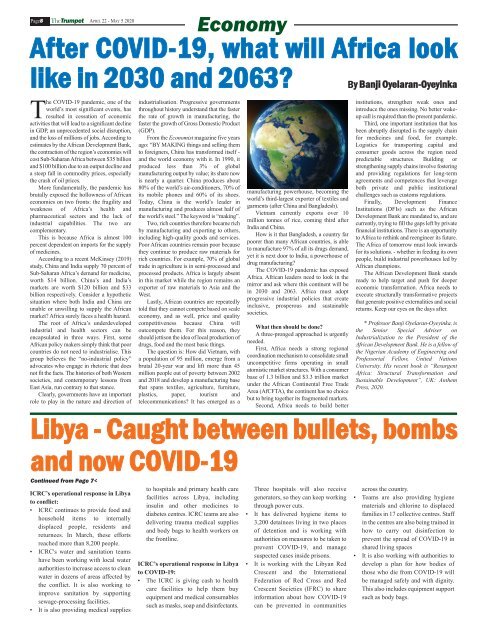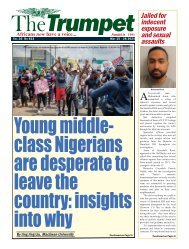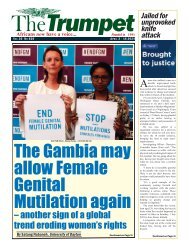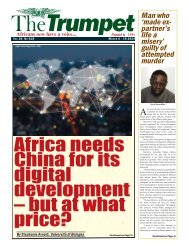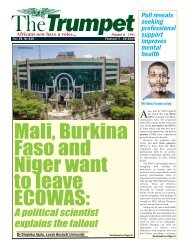The Trumpet Newspaper Issue 517 (April 22 - May 5 2020)
End crackdown on journalists
End crackdown on journalists
Create successful ePaper yourself
Turn your PDF publications into a flip-book with our unique Google optimized e-Paper software.
Page8 <strong>The</strong><strong>Trumpet</strong> APRIL <strong>22</strong> - MAY 5 <strong>2020</strong><br />
Economy<br />
After COVID-19, what will Africa look<br />
like in 2030 and 2063?<br />
By Banji Oyelaran-Oyeyinka<br />
<strong>The</strong> COVID-19 pandemic, one of the<br />
world’s most significant events, has<br />
resulted in cessation of economic<br />
activities that will lead to a significant decline<br />
in GDP, an unprecedented social disruption,<br />
and the loss of millions of jobs. According to<br />
estimates by the African Development Bank,<br />
the contraction of the region’s economies will<br />
cost Sub-Saharan Africa between $35 billion<br />
and $100 billion due to an output decline and<br />
a steep fall in commodity prices, especially<br />
the crash of oil prices.<br />
More fundamentally, the pandemic has<br />
brutally exposed the hollowness of African<br />
economies on two fronts: the fragility and<br />
weakness of Africa’s health and<br />
pharmaceutical sectors and the lack of<br />
industrial capabilities. <strong>The</strong> two are<br />
complementary.<br />
This is because Africa is almost 100<br />
percent dependent on imports for the supply<br />
of medicines.<br />
According to a recent McKinsey (2019)<br />
study, China and India supply 70 percent of<br />
Sub-Saharan Africa’s demand for medicine,<br />
worth $14 billion. China’s and India’s<br />
markets are worth $120 billion and $33<br />
billion respectively. Consider a hypothetic<br />
situation where both India and China are<br />
unable or unwilling to supply the African<br />
market? Africa surely faces a health hazard.<br />
<strong>The</strong> root of Africa’s underdeveloped<br />
industrial and health sectors can be<br />
encapsulated in three ways. First, some<br />
African policy makers simply think that poor<br />
countries do not need to industrialise. This<br />
group believes the “no-industrial policy”<br />
advocates who engage in rhetoric that does<br />
not fit the facts. <strong>The</strong> histories of both Western<br />
societies, and contemporary lessons from<br />
East Asia, run contrary to that stance.<br />
Clearly, governments have an important<br />
role to play in the nature and direction of<br />
industrialisation. Progressive governments<br />
throughout history understand that the faster<br />
the rate of growth in manufacturing, the<br />
faster the growth of Gross Domestic Product<br />
(GDP).<br />
From the Economist magazine five years<br />
ago: “BY MAKING things and selling them<br />
to foreigners, China has transformed itself -<br />
and the world economy with it. In 1990, it<br />
produced less than 3% of global<br />
manufacturing output by value; its share now<br />
is nearly a quarter. China produces about<br />
80% of the world’s air-conditioners, 70% of<br />
its mobile phones and 60% of its shoes.<br />
Today, China is the world’s leader in<br />
manufacturing and produces almost half of<br />
the world’s steel.” <strong>The</strong> keyword is “making”.<br />
Two, rich countries therefore became rich<br />
by manufacturing and exporting to others,<br />
including high-quality goods and services.<br />
Poor African countries remain poor because<br />
they continue to produce raw materials for<br />
rich countries. For example, 70% of global<br />
trade in agriculture is in semi-processed and<br />
processed products. Africa is largely absent<br />
in this market while the region remains an<br />
exporter of raw materials to Asia and the<br />
West.<br />
Lastly, African countries are repeatedly<br />
told that they cannot compete based on scale<br />
economy, and as well, price and quality<br />
competitiveness because China will<br />
outcompete them. For this reason, they<br />
should jettison the idea of local production of<br />
drugs, food and the most basic things.<br />
<strong>The</strong> question is: How did Vietnam, with<br />
a population of 95 million, emerge from a<br />
brutal 20-year war and lift more than 45<br />
million people out of poverty between 2002<br />
and 2018 and develop a manufacturing base<br />
that spans textiles, agriculture, furniture,<br />
plastics, paper, tourism and<br />
telecommunications? It has emerged as a<br />
manufacturing powerhouse, becoming the<br />
world’s third-largest exporter of textiles and<br />
garments (after China and Bangladesh).<br />
Vietnam currently exports over 10<br />
million tonnes of rice, coming third after<br />
India and China.<br />
How is it that Bangladesh, a country far<br />
poorer than many African countries, is able<br />
to manufacture 97% of all its drugs demand,<br />
yet it is next door to India, a powerhouse of<br />
drug manufacturing?<br />
<strong>The</strong> COVID-19 pandemic has exposed<br />
Africa. African leaders need to look in the<br />
mirror and ask where this continent will be<br />
in 2030 and 2063. Africa must adopt<br />
progressive industrial policies that create<br />
inclusive, prosperous and sustainable<br />
societies.<br />
What then should be done?<br />
A three-pronged approached is urgently<br />
needed.<br />
First, Africa needs a strong regional<br />
coordination mechanism to consolidate small<br />
uncompetitive firms operating in small<br />
atomistic market structures. With a consumer<br />
base of 1.3 billion and $3.3 trillion market<br />
under the African Continental Free Trade<br />
Area (AfCFTA), the continent has no choice<br />
but to bring together its fragmented markets.<br />
Second, Africa needs to build better<br />
institutions, strengthen weak ones and<br />
introduce the ones missing. No better wakeup<br />
call is required than the present pandemic.<br />
Third, one important institution that has<br />
been abruptly disrupted is the supply chain<br />
for medicines and food, for example.<br />
Logistics for transporting capital and<br />
consumer goods across the region need<br />
predictable structures. Building or<br />
strengthening supply chains involve fostering<br />
and providing regulations for long-term<br />
agreements and competences that leverage<br />
both private and public institutional<br />
challenges such as customs regulations.<br />
Finally, Development Finance<br />
Institutions (DFIs) such as the African<br />
Development Bank are mandated to, and are<br />
currently, trying to fill the gaps left by private<br />
financial institutions. <strong>The</strong>re is an opportunity<br />
to Africa to rethink and reengineer its future.<br />
<strong>The</strong> Africa of tomorrow must look inwards<br />
for its solutions. - whether in feeding its own<br />
people, build industrial powerhouses led by<br />
African champions.<br />
<strong>The</strong> African Development Bank stands<br />
ready to help target and push for deeper<br />
economic transformation. Africa needs to<br />
execute structurally transformative projects<br />
that generate positive externalities and social<br />
returns. Keep our eyes on the days after.<br />
* Professor Banji Oyelaran-Oyeyinka, is<br />
the Senior Special Adviser on<br />
Industrialization to the President of the<br />
African Development Bank. He is a fellow of<br />
the Nigerian Academy of Engineering and<br />
Professorial Fellow, United Nations<br />
University. His recent book is “Resurgent<br />
Africa: Structural Transformation and<br />
Sustainable Development”, UK: Anthem<br />
Press, <strong>2020</strong>.<br />
Libya - Caught between bullets, bombs<br />
and now COVID-19<br />
Continued from Page 7<<br />
ICRC’s operational response in Libya<br />
to conflict:<br />
• ICRC continues to provide food and<br />
household items to internally<br />
displaced people, residents and<br />
returnees. In March, these efforts<br />
reached more than 8,200 people.<br />
• ICRC's water and sanitation teams<br />
have been working with local water<br />
authorities to increase access to clean<br />
water in dozens of areas affected by<br />
the conflict. It is also working to<br />
improve sanitation by supporting<br />
sewage-processing facilities.<br />
• It is also providing medical supplies<br />
to hospitals and primary health care<br />
facilities across Libya, including<br />
insulin and other medicines to<br />
diabetes centres. ICRC teams are also<br />
delivering trauma medical supplies<br />
and body bags to health workers on<br />
the frontline.<br />
ICRC’s operational response in Libya<br />
to COVID-19:<br />
• <strong>The</strong> ICRC is giving cash to health<br />
care facilities to help them buy<br />
equipment and medical consumables<br />
such as masks, soap and disinfectants.<br />
Three hospitals will also receive<br />
generators, so they can keep working<br />
through power cuts.<br />
• It has delivered hygiene items to<br />
3,200 detainees living in two places<br />
of detention and is working with<br />
authorities on measures to be taken to<br />
prevent COVID-19, and manage<br />
suspected cases inside prisons.<br />
• It is working with the Libyan Red<br />
Crescent and the International<br />
Federation of Red Cross and Red<br />
Crescent Societies (IFRC) to share<br />
information about how COVID-19<br />
can be prevented in communities<br />
across the country.<br />
• Teams are also providing hygiene<br />
materials and chlorine to displaced<br />
families in 17 collective centres. Staff<br />
in the centres are also being trained in<br />
how to carry out disinfection to<br />
prevent the spread of COVID-19 in<br />
shared living spaces<br />
• It is also working with authorities to<br />
develop a plan for how bodies of<br />
those who die from COVID-19 will<br />
be managed safely and with dignity.<br />
This also includes equipment support<br />
such as body bags.


